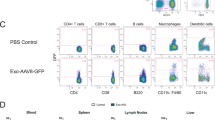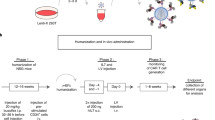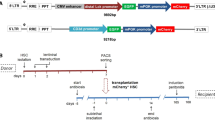Abstract
Stable, efficient gene transfer to normal human peripheral blood mononuclear cells (PBMC) is a prerequisite for therapy of a number of diseases, both hereditary and acquired, affecting these cells. Current approaches to gene transfer to PBMC entail ex vivo mitogenic stimulation and multiple transduction steps followed by selection, usually of progenitor populations. Thus, the ability to transfer gene expression to normal, resting PBMC could complement gene transfer strategies that target dividing precursor cells. We report successful short-term transduction of human PBMC using two different SV40-derived viral vectors. SV40-derivative viruses were constructed by cloning cDNAs for firefly luciferase (luc), or hepatitis B surface antigen (HBSAg), into shuttle plasmids, to create the SV40 derivative viruses SVluc and SV(HBS) respectively. Both genes were cloned downstream from SV40 early promoter. Normal, resting, human PBMC were exposed to these viruses, and unselected cultured cells were assayed 24 to 48 h later for expression of transduced genes by immunochemistry and Northern blot analysis. Expression of both luciferase and HBSAg was detected using both approaches. Levels of expression of luciferase were slightly higher in PBMC which were stimulated with concanavalin A (con A). Conversely, expression of HBSAg was less in con A-stimulated PBMC, compared with unstimulated cells. Con A stimulation did not alter infectivity of PBMC by SV40-derivative virus. While longevity and stability of expression in vitro are as yet unknown, this demonstration of successful gene transfer to resting, normal human PBMC, assayed on unselected cells, suggests that SV40-based transduction systems may be potential candidates for use in transient gene transfer to mononuclear blood cells.
This is a preview of subscription content, access via your institution
Access options
Subscribe to this journal
Receive 12 print issues and online access
$259.00 per year
only $21.58 per issue
Buy this article
- Purchase on Springer Link
- Instant access to full article PDF
Prices may be subject to local taxes which are calculated during checkout
Similar content being viewed by others
Author information
Authors and Affiliations
Rights and permissions
About this article
Cite this article
Strayer, D., Kondo, R., Milano, J. et al. Use of SV40-based vectors to transduce foreign genes to normal human peripheral blood mononuclear cells. Gene Ther 4, 219–225 (1997). https://doi.org/10.1038/sj.gt.3300368
Received:
Accepted:
Issue Date:
DOI: https://doi.org/10.1038/sj.gt.3300368
Keywords
This article is cited by
-
Intracisternal rSV40 administration provides effective pan-CNS transgene expression
Gene Therapy (2012)
-
Gene transfer to the rhesus monkey brain using SV40-derived vectors is durable and safe
Gene Therapy (2011)
-
Efficient CNS gene delivery by intravenous injection
Nature Methods (2010)
-
Gene Transfer to the Cerebellum
The Cerebellum (2010)
-
Strategies for CNS-directed gene delivery: in vivo gene transfer to the brain using SV40-derived vectors
Gene Therapy (2007)



